The logistics industry has been characterized by seeking innovation and modernization in accelerated ways, either by automating processes, tracking where products are in real time, or strengthening systems that help with prediction, etc.

Currently, we hear about multiple technologies and applications that strengthen this premise of improvement, one of them is Blockchain.
Continue with this reading where we will talk about how Blockchain will boost the logistics sector and why.
What is Blockchain and how does it benefit logistics?
The general definition that describes the Blockchain is chain of blocks that contain information. According to IBM, it is a large shared and unalterable ledger, by which we will be able to track transactions and assets through a commercial network.
Within the assets we can have tangibles, such as products; or intangibles, such as intellectual property. Let's take a look at how it works:
The Blockchain works intelligently through encrypted information from a transaction on the network, recording the information and characters of your choice. The information entered is distributed in various independent nodes, however, each block is connected to the one before and after it, securely linking and verifying the entire chain of blocks.
Starting from this, let's focus on how is the Blockchain related to logistics? Companies require accurate and real-time information from their supply chain, which is where the Blockchain makes its appearance; it provides immediate and transparent information, which is stored in an unalterable ledger and can only be accessed by members who have permission within the network. In a simple way, the Blockchain can create more efficient routes, track purchase orders, payments to suppliers, accounting accounts, reduce errors, optimize time and resources. Technology that takes care of the operation!
The use of this technology offers a clear impact on the profitability of companies in this sector, in addition to solving trust and manipulation problems, speeding up processes, reducing risks and increasing transparency.
And yes, there are also barriers and challenges of the Blockchain in logistics; According to PwC figures, the top three barriers to Blockchain technology adoption in this area are:
● Regulatory uncertainty (48%).
● Lack of trust among users (45%).
● Ability to unite different networks (44%).
Uses and benefits of Blockchain in logistics.
By now, you are surely wondering, how will I see the Blockchain applied in my logistics operations? Let's see a practical and simple example.
MarketsandMarkets projects that supply chain management will reach 45.2 billion dollars by 2027. However, there are external eventualities and those of the market itself that leave millions of losses every year, drastically reducing profitability. And then, here we can resort to the Blockchain, which has the power to safeguard the operation and take care of all the processes.
How does it work?
● Smart Contract According to information from Iberdrola, "a smart contract is written in virtual language and has the power to execute and enforce itself, autonomously and automatically, based on a series of programmed parameters."
This tool promotes and reinforces security and trust between both parties, leaving out falsifications or breaches of trust.
Continuing with the information from Iberdrola, this is the process of a smart contract:
1.-A user initiates a transaction from his wallet on the blockchain. 2.-The transaction reaches the distributed database, where the identity is confirmed. 3.-The transaction is approved, which can be a transfer of funds. 4.-The transaction includes the code that defines what type of transaction should be executed. 5.-Transactions are added as a block within the blockchain. 6.- Any change in the status of the contract follows the same process to be updated.
●Complete traceability is achieved. The Blockchain allows the traceability of the products to be guaranteed, and with this, integrates ethical pillars of reliability. We can see this in the traceability according to the location, updates of each change or modification that the product undergoes throughout its life cycle.
●Routes Optimization. Thanks to the traceability that the product will have, this will allow identifying patterns to optimize routes and reduce transportation costs.
●Transparency. The traceability that the Blockchain has will also bring greater transparency, since supply chains today are complex and there are many actors involved. This transparency will enable further real-time analysis of the supply chain.
As you have noticed, Blockchain technology provides multiple benefits to logistics, which are aimed at having greater control over the different stages through which a product passes until its final delivery, which impacts transfer times and reduces costs. , For example.
Some of the many companies that have begun to implement blockchain in logistics are: Walmart, Maersk and Nestlé.
Have you already started with Blockchain implementations in your supply chain?
Posted by: G.I.Eicom
Leaders in Material Handling & Intralogistics Solutions